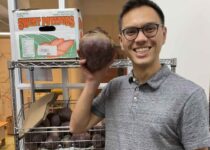“What did one beet say to the other?” “I dunno, beats me!” ¡Hola! Salaam! Bonjour,…

From Awareness to Action: Combatting Injustices Through Sanctuary Farm
As a year-long volunteer addressing racial, economic, and social injustices, my main focus in Philadelphia and at Sanctuary Farm is advocating for social justice. To be an effective advocate I believe it is important to both educate myself on the injustices that the individuals I serve may face and then take what I have learned and act in a way that directly combats these injustices.
We recently started a book club for farm staff, volunteers, and anyone else in the community that may be interested. The book that we are currently reading is “Poverty, by America” written by Matthew Desmond. It is a very compelling book that addresses the causes of poverty in depth and offers solutions that we can take to “abolish” it. Instead of evaluating poverty by only focusing on the individuals that experience it, Desmond turns his attention towards everyone that benefits from the poverty of others which unfortunately is a large portion of the U.S. population. While reading the book I noticed that a few of Desmond’s examples were occurring right before my eyes in Philadelphia. For example, in one chapter Desmond talks about how many minority individuals that are living in poverty are less likely to have a bank account compared to middle/upper class white individuals. This means they are often left with no choice but to cash their paychecks at cash checking services in which they are charged for doing so. In forcing low-income individuals to use a system in which they will be charged, the cycle of poverty in these communities is perpetuated. Desmond also includes that cash checking services are much more prevalent in communities in which low-income individuals live. Once I read that chapter, I began to notice that a number of stores with check-cashing were far more frequent in the community I serve, while banks are found on most streets just a few blocks away in the more affluent parts of Philadelphia.
In his book Desmond also explained that many people experiencing poverty or social injustice have no idea about the available services. Each year the government spends a certain amount of money on social services, aiming to help impoverished communities, when in reality these communities do not receive the services meant for them because they do not know they are there. This was something I knew that we could help with at the farm. Each week on Tuesdays, my coworker and I put up a bulletin board with various resources pertaining to education, housing, food, legal, and family services that are offered in the community so people that are visiting the farm stand can receive the information and benefit from the services they are entitled to. It is a simple way to be an advocate for social injustice and it helps the individuals living in this community take the power back into their own hands. It also gives me another opportunity to actively engage with the community and receive feedback on what specifically is needed from them. By educating myself on the issues the community I serve faces and taking action based on what I have learned, I believe I am becoming a true advocate for social justice.
Lynore Shaffer: Philadelphia, Pennsylvania



This Post Has 0 Comments